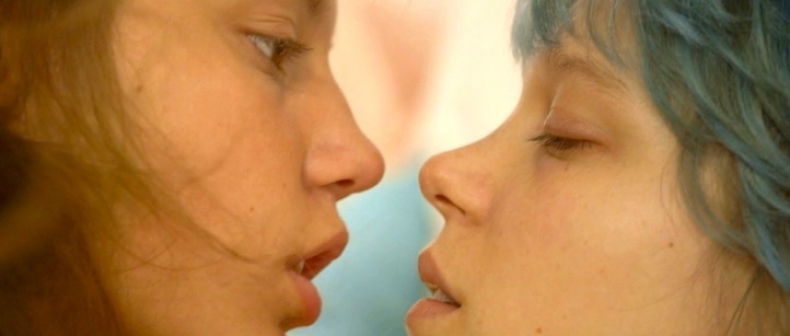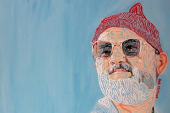
Everyone’s talking about Adèle Exarchopoulos and Léa Seydoux. Not only thanks to their stunning performances in ‘Blue Is the Warmest Color,’ which earned the Palme d’Or at this year’s Cannes Film Festival, but also because they’re two badass chicks who tell it like it is. The actresses spoke out against director Abdellatif Kechiche’s methods and the work conditions on set in a recent interview with The Daily Beast, saying they’d never work with him again. I sat down with Adèle and Léa at TIFF to talk about the reaction to that interview, what happens when they see Abdellatif again, and, of course, the marathon lesbian sex scene that’s freaking out America.
I’ll start by saying that I read The Daily Beast interview and I thought it was just fantastic. What sort of feedback have you gotten since it was published?
L: Why did you think it was fantastic?
Well, because it was inspiring. So many females are exploited and poorly treated in the entertainment industry, but no one ever has the guts to speak out and tell the truth. Also, interviews are often just so boring these days. This was one of the best I’ve read in awhile.
L: Thank you for saying that, thank you (claps hands)! You’re the first person to say that!
What made you decide to do it? Was it spontaneous?
L: Yes! The thing is that it was spontaneous and what we said is true, but it we were also laughing about it. The thing is that when you read it on paper, it’s very violent. Well, it was very violent on the set. And now we want to talk more about our work.
A: Yes, we want to speak more about the movie because journalists make it bigger and bigger, and there’s consequences and everything. And now it’s not the point.
L: But it’s true that we said, like yeah, it was a very difficult shooting.
But I’m shocked to hear I’m the first person you’ve heard say they liked the interview. That’s crazy to me. Really?
L: It’s amazing because, you know, when we said that I felt that everyone was like (violently pounds hand into fist to mimic people coming down on them). Because we’re under pressure. They were like “No you don’t have to say that. Why’d you say that?! It’s bad for the film!”
A: People said that you cannot do that to someone who has taken you so high, after winning the Palme d’Or. you can’t say that. And we’re like, sorry, but we’re just saying the truth. But we never questioned his greatness, just his methods.
L: Yes, we say that he’s a great director, it’s just the technique. We suffered a lot on this film, but there’s a point where you’re doing your job. You’re an actress, he’s the director, and you want to work and you offer yourself to him. And I really believe in collaboration. But there were times where it wasn’t collaboration. And when you have someone who is manipulating, you’re like what am I doing? It touches you deeply. But that’s how it was, and we are very proud of the flim. Even if he has very tough manners, we think that he is a very talented director. We worked very hard on this film and, now, I really want to talk about my work.
A: I want to celebrate my work. I want to talk about the work and not the suffering part.
So then what was a good experience on set for you?
L: We had a strong connection, and I think we needed that. Adele helped me a lot.
A: Yes, it was always reciprocal. It was never like, oh, she has more experience than me, she’s different than me.
L: There was never any competition.
A: She knows what I’ve been through, and I know what she’s been through.
A: Even with The Daily Beast, it’s so hard to explain a shoot. It’s human adventure with a lot of ups and downs. Sometimes there are more ups, sometimes there are more downs. Sometimes it broke, sometimes it was really hard, and that’s why we’re so close. She understands everything I’ve been through.
L: I really enjoyed working with Adele and I really enjoyed making a passionate movie like this, a love story. And I noticed that after, not during the shoot.
A: Yes, because we all love love stories… and Ryan Gosling. And it makes it real passion, where people can recognize themselves. The first love that can hurt you and break you… like I remember my first love and I was destroyed. I was like, “I want to die, it was the best, it will never be the same!” And it’s about how after all these experiences you can meet other people, and you can love again, and you can trust again. It’s a common story. It’s simple, just two people meeting. Not homosexuals, just two people who meet each other. And all of the art stuff, the close-ups, the complexity of her character and my character.
It was extremely relatable. Like you said, it isn’t exclusively a lesbian love story. It’s the stuff all relationships are made of, homosexual or otherwise.
L: And you forget that it’s two women. You don’t care.
I have to ask you about the sex scene. You’ve said that it was unchoreographed. So how did you decide, well, what you were going to do?
L: Just body language. We were just there trying things.
A: At the beginning she was domineering, so it was easier for me because I just had to let her show me.
L: Sure, we felt vulnerable and everything, but you just have to let it go. And at the beginning you can take pleasure in it. I was taking pleasure in it – not sexually – but in acting it.
A: Me too, me too. It was like a game, like when you’re little girls and you’re playing mother and father.
L: And I really liked the challenge and I really like to take risks, so I was very happy to do the scenes. But it was hard because it was very long. We spent days and days and weeks, and of course sometimes you feel humiliated. But otherwise it was pleasure. And, the other thing, it’s so funny how people in America made such a big deal of it, because in American films you have so much violence. And we never talk about violence; it’s something that’s normal. But then you have sex scenes and it’s shocking. I hope that this film will help make things a little bit more evolved here in America.
A: I you just have to take distance. Because people are shocked because they think it’s really realistic, so they take pleasure in letting their imaginations run… it’s real, it’s not real, it’s weird, it’s disturbing… the question is why? The answer for me is that it’s disturbing because I have some complexes, like everyone seeing my big ass. But if it weren’t me, I think I’d take pleasure in watching the scene.
Does it get less embarrassing as time goes on and you talk about it more?
A: No, I think we’re always talking about it. There was never a tension between us. I mean, we can do the interview naked if you want (laughs).
I’d be careful which reporters you make that offer to (laughing). Someone will take you up on it. But did Abdellatif offer you any direction for the scene?
L: Yes, sometimes he was like “more, I want to you to have more pleasure.” But not feel more pleasure, more like (makes orgasm noises). Like when you have an orgasm, he wanted more orgasms and sometimes it was kind of embarrassing. But that’s the only thing. He wanted to show passion and he wanted us to be very into it and instinctive.
A: We’d have direction sometimes like, “You go first, you take the lead.”
Reading about your experience with the fight scene, it sounded terrible. Did you (speaking to Adèle) get hurt?
A: No, I didn’t get hurt. Of course it was difficult to make the scene because it was a difficult scene and it was hard to feel guilty and show sadness…
L: Oh, but you did!
A: Oh yes, my hand! My hand started to bleed, but that was nothing (uses her fingers to show me how tiny the wound was). I was suffering more emotionally in this scene than anything else. But it was nothing; it was just an anecdote. It was more intense emotionally than physically.
Did you have to stay in character the entire time on set? Or were you able to take breaks?
A: During the shoot if you said you needed some time or wanted to drink a beer, [Abdellatif] was like buying beer and drinking with us. But we have to be involved during all the shooting, during all the days, months, year. But if you wanted to take time, like minutes or even hours from concentrating, you could take your time. He was really respectful about that.
So I know Abdellatif is here with you in Toronto. Have you spoken to him since The Daily Beast interview broke?
L: Erm, no. (Hangs heads and winces).
A: But… I’m sure we will.
L: Yeah, we will.
A: I think it’s not a good situation, and it will be personal, but all the things we said were true, even if I regret the way it was said. I can understand that he felt betrayed because it came out like that on the internet, but it was the truth. Maybe he’d have taken in more easily if I came and told him, but…
L: But we’re not trying to ruin him, that wasn’t the point. But it just came out like that in the interview and we just described his manners, how he did this film. It’s a very intense technique. It’s a very tough and extremely difficult, but that’s the truth.
A: And also we always say that he was a genius and everything.
L: I think that during the shooting we weren’t able to express ourselves. It was not possible because he’s a tough man, and not only with the actors. With everybody.
A: And with himself I think, too.
L: But he doesn’t listen. Sometimes I was like Abdellatif, can you imagine how hard it is for us?
A: He’d say “No, it’s not…”
L: He’d say “No, it’s not, because you make cinema.”
A: And he’s right, in a sense.
L: But it’s a job, I was there to work. Not there to have someone who’s like “Bam bam bam!” It was beyond acting. There’s a point where it’s not acting anymore and you’re just suffering.
A: But it’s complex because, for example, it really helped me. That’s why it’s a movie like this. That’s why people are so impressed, because sometimes we really loved each other and sometimes it was really painful and that, for me, made him a genius. Of course there were bad moments, and we tell those, but we don’t want to denounce him.
L: But me, for example, I don’t feel I need that technique to go as far. If I have someone who’s very tough on me, sometimes I feel blocked because it becomes not about the character but against me personally. Those are his methods, and I don’t believe it makes you better. Really I don’t think that. But, he’s a good director and storyteller.
Do you think he’ll be understanding when you do speak with him?
L: No, because when I was telling him that it was tough on the set and asking him to have empathy for us and understand, he was like, “No, you don’t suffer. You don’t know what it is to suffer. Suffering is to be a worker, to be like a worker working in a factory.”
A: But I think it depends. I understand everything you said (talking to Lea), but for me it works. Someone pushing me and not letting go. He pushed me. Sometimes for a bad reason–sometimes I cried because I thought it was unfair, sometimes I cried because I wanted to kill him, but I think I needed it. But Abdellatif can put you in some states you’ve never been in before. I know that he helped me to make this.
L: For me, it’s the contrary. It’s not a technique I like. I don’t want to suffer on the film.
A: It’s not that I want to suffer, it’s…
L: The thing is he uses your own emotion, your own emotion as a human being, and he puts your emotion in the film. That’s not what I want. What I want is to build a character. I want a real collaboration, I don’t want to feel manipulated. But he’s a very good director and I think his films are brilliant.
*This interview was edited for length and clarity.
____
Sabrina Maddeaux is Toronto Standard’s managing editor. Follow her on Twitter at @sabrinamaddeaux.
For more, follow us on Twitter @TorontoStandard and subscribe to our newsletter.














